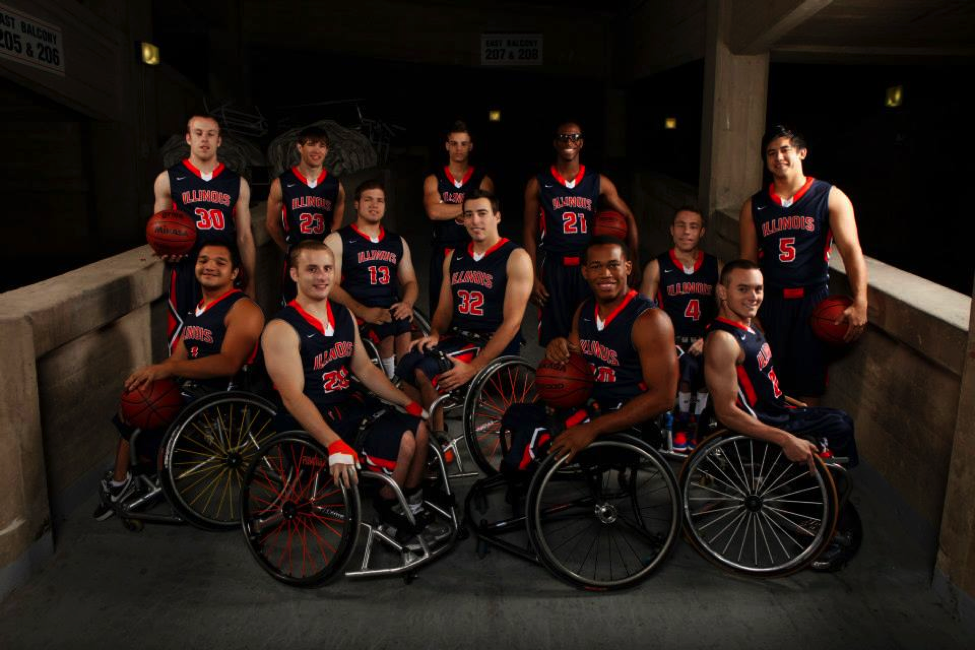The University of Illinois is a school built upon tradition, so it comes as no surprise that the University has the oldest wheelchair basketball program in the country. Not to mention the U of I is one of the most wheelchair accessible universities in the nation. The program was founded in 1948, and has since won 15 Men’s and 14 Women’s National Championships. This weekend, you’ll be able to catch them in action at the ARC on campus for their last home tournament of the season. I spoke with a bunch of the players on both squads prior to the upcoming bouts.
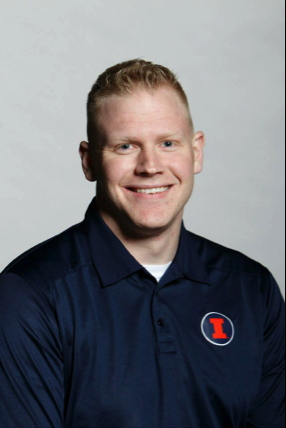 The men’s team is coached by Matt Buchi (right); this is his first year as head coach but he is not a “newbie” to the game by any means. Matt is a former Illinois player who has been playing since he was nine, after being involved in a car accident that left him confined to a wheelchair. He started off with physical therapy, but one day he ventured to a wheelchair basketball practice and knew instantly — this was the thing for him. He has been playing ever since and while speaking with him, he made it clear he plans to keep wheelchair basketball in his life for many years to come:
The men’s team is coached by Matt Buchi (right); this is his first year as head coach but he is not a “newbie” to the game by any means. Matt is a former Illinois player who has been playing since he was nine, after being involved in a car accident that left him confined to a wheelchair. He started off with physical therapy, but one day he ventured to a wheelchair basketball practice and knew instantly — this was the thing for him. He has been playing ever since and while speaking with him, he made it clear he plans to keep wheelchair basketball in his life for many years to come:
It’s brought me so much and it’s given so much to be a part of this sport that I just try to do my best to try to give back to it and know that the opportunities that I’ve received from the sport, I want to have those opportunities given to other guys to.
Wheelchair basketball is a fast-paced, strategic game. The court is the same size as you would find in any standard gym, and the hoops are kept at regulation height of ten feet as well. There isn’t a double-dribble rule — but traveling is still in play. For every two pushes, there must be a dribble, and a third push is traveling. Imagine sitting in a fold-up lawn chair at the three-point line with your back pressed against the seat launching the ball up with hopes to score. Doesn’t seem so easy, right? Well, the men and women’s wheelchair basketball team do it with ease.
 Nick Gonchi from the men’s team loves the strategy behind the game:
Nick Gonchi from the men’s team loves the strategy behind the game:
It’s like a fast-paced chess game because you can really eliminate people out of the game if you really want to where stand-up basketball you can set a pick and they can still go around but with wheelchair basketball you can literally stop them.
Gonchi hails from Saskatchewan, and plays for Canada’s national team in addition to his time with the U of I. Losing his leg to cancer when he was 15 (going on 16), getting into wheelchair basketball gym class as a kid taught him that when one door closes, many more open. He hopes to play in the European league upon graduation for a year or two and eventually return to school to become a dentist.
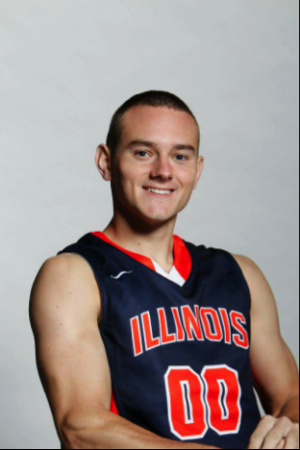 The team is currently gearing up for nationals with hopes of getting another title to add to the list. The team is led by team captain Jake Tyree (left), who was recruited in high school after his team won nationals by Alabama, Missouri and Illinois, but chose U of I for its academics. However, his career with wheelchair basketball started long before then. When he was nine years old, Jake was struck with cancer within his spinal cord. He underwent surgeries and radiation to try and remove it, but instead of getting better, his cancer actually fed off the radiation and was growing further up his spinal cord towards his brain stem. They gave him 6-9 months to live. With this news, Jake went into experimental treatment and started looking at really extreme surgeries; one idea being to go in and cut out that part of his spinal cord that was affected. His doctor had only performed the surgery once before (that unfortunately did not end well). However, Jake was optimistic in attitude and knew he would be a success story for his doctor to tell. Low and behold — here he is, cancer free for 11 years with already so much accomplished and much more down the road to add to the list.
The team is currently gearing up for nationals with hopes of getting another title to add to the list. The team is led by team captain Jake Tyree (left), who was recruited in high school after his team won nationals by Alabama, Missouri and Illinois, but chose U of I for its academics. However, his career with wheelchair basketball started long before then. When he was nine years old, Jake was struck with cancer within his spinal cord. He underwent surgeries and radiation to try and remove it, but instead of getting better, his cancer actually fed off the radiation and was growing further up his spinal cord towards his brain stem. They gave him 6-9 months to live. With this news, Jake went into experimental treatment and started looking at really extreme surgeries; one idea being to go in and cut out that part of his spinal cord that was affected. His doctor had only performed the surgery once before (that unfortunately did not end well). However, Jake was optimistic in attitude and knew he would be a success story for his doctor to tell. Low and behold — here he is, cancer free for 11 years with already so much accomplished and much more down the road to add to the list.
Tyree started playing wheelchair basketball when he was between 12-13 years old after he saw a demonstration at his hospital. Upon graduation, he also hopes to play in the European league (because who wouldn’t want to be paid to live in Europe and get to play the sport you love?). His back-up plan is also quite impressive: He intends to work with disability policies for injured veterans to help make their lives easier after combat. When asking Tyree what is the best thing wheelchair basketball has given him — he said it was all of the friendships he developed off the court. He has been able to make friends from all across the country and around the world. He’s excited for this weekend but it is also bittersweet since it is his last home tournament before graduation.

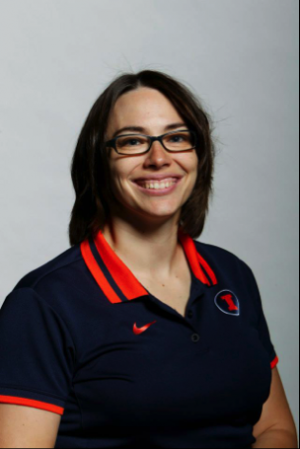 The women’s team is coached by Stephanie Wheeler, who has quite the impressive résumé. She is an alumnus of the U of I who graduated with her degree in Kinesiology, and also played here from 1999-2004. During her career at the U of I, she was a part of three national championship winning teams. From there, she became a member of the U.S. women’s national team. That team earned gold medals at the Paralympic Games in the 2004 Athens games, and in 2008 in Beijing. She is currently in Colorado Springs coaching the U.S. women’s national team who will compete at the world championships this summer in Toronto, and in 2016 for the Rio Paralympic Games. With all of that experience, Wheeler has a lot to bring to the table and much to offer to her players:
The women’s team is coached by Stephanie Wheeler, who has quite the impressive résumé. She is an alumnus of the U of I who graduated with her degree in Kinesiology, and also played here from 1999-2004. During her career at the U of I, she was a part of three national championship winning teams. From there, she became a member of the U.S. women’s national team. That team earned gold medals at the Paralympic Games in the 2004 Athens games, and in 2008 in Beijing. She is currently in Colorado Springs coaching the U.S. women’s national team who will compete at the world championships this summer in Toronto, and in 2016 for the Rio Paralympic Games. With all of that experience, Wheeler has a lot to bring to the table and much to offer to her players:
I’ve become the person that I am today because of basketball and the amazing experiences that I have gained from playing and coaching. The will to succeed, the toughness to fight through adversity, the togetherness of being member of a team…those are the lasting impacts from sports that are with you long after your playing or coaching days are finished.
The women’s team is comprised of a core of girls that includes four juniors and two seniors. They have been playing together for almost three full seasons, which definteily shows as the team has developed.
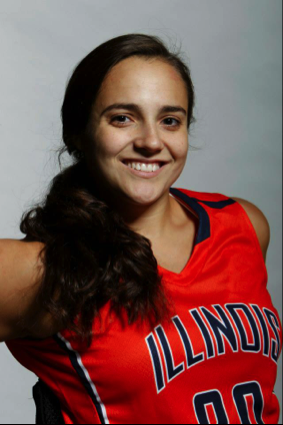 Carlie Cook, a senior out of Michigan, is one of those core players. She has been playing for around eight years and got her start while at a sports expo at Michigan State University. Some of the people there encouraged her to get in the basketball chair and try it out and it happened to be love at first dribble. From there she joined a junior’s team and got more involved in the sport until it finally led her to the U of I, which she chose because of its long standing tradition, in addition to the academic and athletic excellence of both the school and the wheelchair basketball program.
Carlie Cook, a senior out of Michigan, is one of those core players. She has been playing for around eight years and got her start while at a sports expo at Michigan State University. Some of the people there encouraged her to get in the basketball chair and try it out and it happened to be love at first dribble. From there she joined a junior’s team and got more involved in the sport until it finally led her to the U of I, which she chose because of its long standing tradition, in addition to the academic and athletic excellence of both the school and the wheelchair basketball program.
When asking Carlie what her favorite part of the sport was, she had this to say:
I love how fast, loud and intense the sport is. The feeling of being in the zone of basketball where nothing else matters is an amazing feeling. Secondly, I love the team aspect of the game and the idea of working together with your teammates every day to accomplish the same thing; winning a championship in March.
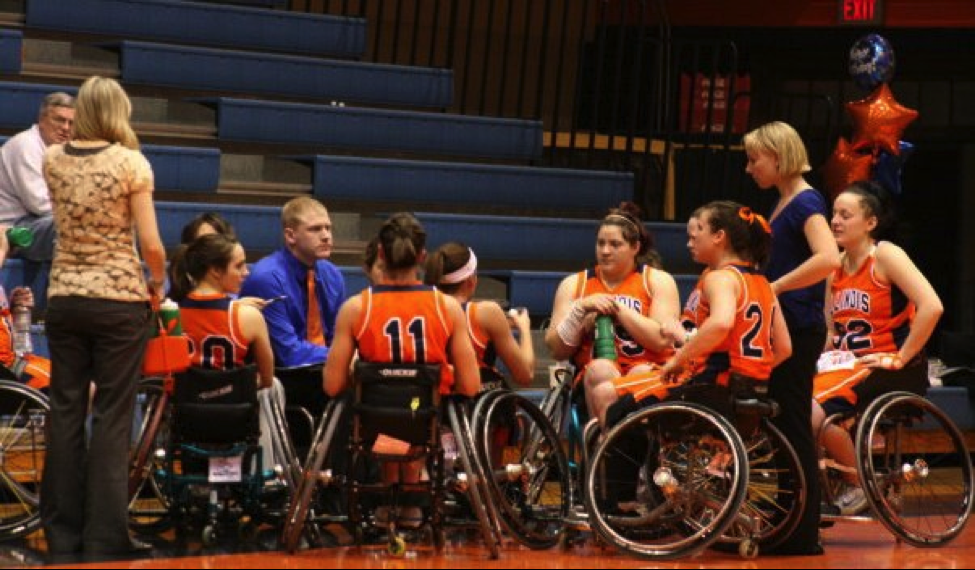 Another core player is Megan Bunk, who is also a senior from Washington. When Megan was 18, she was in a motorcycle accident; a year a guy her age that was also recently injured told her about wheelchair basketball. They went and checked it out together and now she has been playing ever since. Bunk loves wheelchair basketball because it has given her the opportunity to be involved in sports again which is something she was not sure of after her accident. Wheelchair basketball has taught her many things, but the most meaningful one would have to be “It has given me confidence and taught me how to have fun and be myself again… which after the accident I was having a hard time with.”
Another core player is Megan Bunk, who is also a senior from Washington. When Megan was 18, she was in a motorcycle accident; a year a guy her age that was also recently injured told her about wheelchair basketball. They went and checked it out together and now she has been playing ever since. Bunk loves wheelchair basketball because it has given her the opportunity to be involved in sports again which is something she was not sure of after her accident. Wheelchair basketball has taught her many things, but the most meaningful one would have to be “It has given me confidence and taught me how to have fun and be myself again… which after the accident I was having a hard time with.”
Be sure to check both teams in action this Friday and Saturday at the ARC as they begin to gear up for Nationals and strive to bring home another national title. The men’s team plays Friday at 12 and 6 p.m. and Saturday at 11:30 a.m. and 3:00 p.m.. The women’s team will play Friday at 3:30 p.m. and Saturday at 1:15 p.m. and 4:45 p.m.. The tournament is free to the public.








